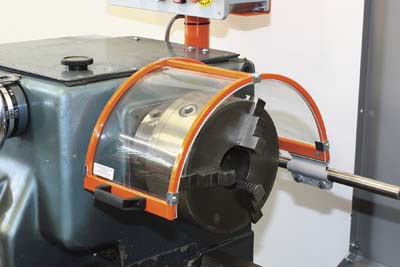Lathe Shields
Lathe Shields
Rockford Systems Inc. offers a new line of electrically interlocked heavy-duty lathe shields.

Rockford Systems Inc. offers a new line of electrically interlocked heavy-duty lathe shields. The use of these electrically interlocked lathe shields goes beyond OSHA and ANSI safety requirements.
These lathe shields have a thermo-formed, impact-resistant, transparent polycarbonate shield that protects operators from direct contact with the upper portion of the rotating chuck. The heavy-duty tubular-steel frame is attached with a steel clamp to support a rotating arm that operates the safety microswitch. When the lathe shield is lifted up, the positive contacts on the microswitch open, sending a stop signal to the machine control. The safety microswitch has an enclosure rating of IP 67 with a mechanical life of one million switching cycles.
These heavy-duty interlocked shields are available in several sizes.





